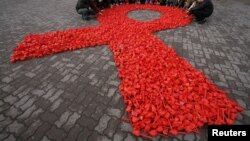WASHINGTON —
The National Aids Council (NAC) has released its audited fiscal statement for 2011, showing the organization’s revenue at nearly $35 million, a drop of 13 percent from the previous year.
Leading the causes behind the decrease was the cut in donor funding that affected the entire health sector in Zimbabwe.
The tax supported aids levy brought in $28 million, with only about three percent raked in from the public sector.
Last month activists in Harare protested, accusing the council authorities of misappropriating the aids levy funds, but officials have vowed full transparency in its audit.
NAC financial officer Albert Manenji said the audit was conducted by an independent company which found no evidence of embezzlement of funds as alleged by some concerned AIDS activists.
“There is nothing amiss about our funds as every cent is accounted for,” said Manenji, adding that they have since submitted the financial statement to the Ministry of Health.
More than 1.2 million people, who are currently receiving anti-retroviral drugs from government and donors, are living with HIV and AIDS in Zimbabwe.
Zimbabwe has one of the highest HIV rates in the world, despite years of effort to slow the spread of the virus.
The pandemic - and the government’s failure to rollout a sound life-prolonging anti-retroviral drug program - has left tens of thousands of AIDS orphans.
Many of these young people are working to make a difference with their lives.
Leading the causes behind the decrease was the cut in donor funding that affected the entire health sector in Zimbabwe.
The tax supported aids levy brought in $28 million, with only about three percent raked in from the public sector.
Last month activists in Harare protested, accusing the council authorities of misappropriating the aids levy funds, but officials have vowed full transparency in its audit.
NAC financial officer Albert Manenji said the audit was conducted by an independent company which found no evidence of embezzlement of funds as alleged by some concerned AIDS activists.
“There is nothing amiss about our funds as every cent is accounted for,” said Manenji, adding that they have since submitted the financial statement to the Ministry of Health.
More than 1.2 million people, who are currently receiving anti-retroviral drugs from government and donors, are living with HIV and AIDS in Zimbabwe.
Zimbabwe has one of the highest HIV rates in the world, despite years of effort to slow the spread of the virus.
The pandemic - and the government’s failure to rollout a sound life-prolonging anti-retroviral drug program - has left tens of thousands of AIDS orphans.
Many of these young people are working to make a difference with their lives.








